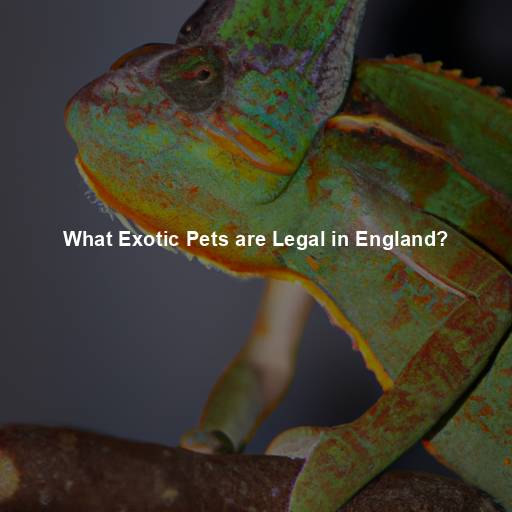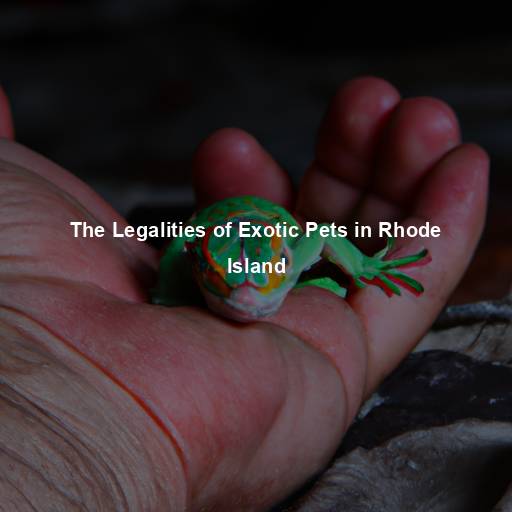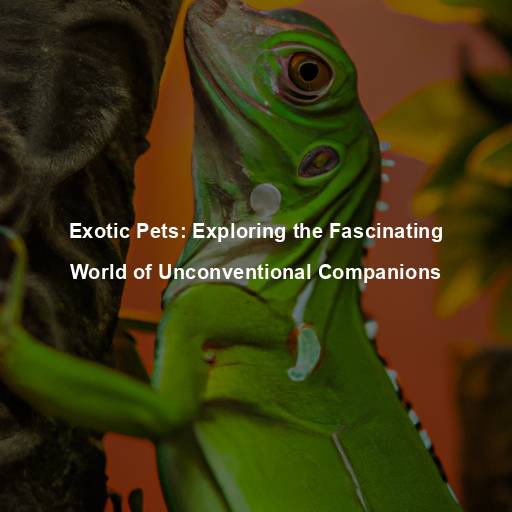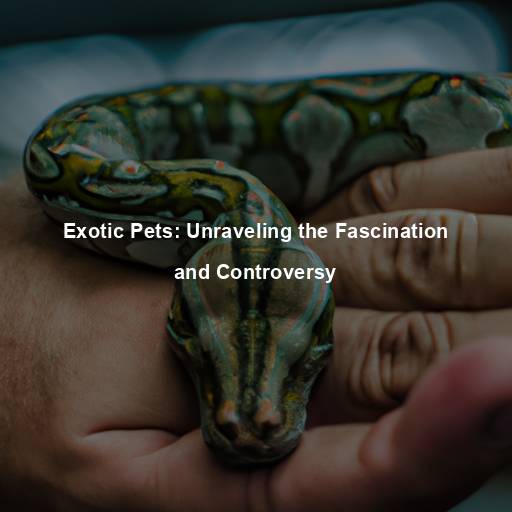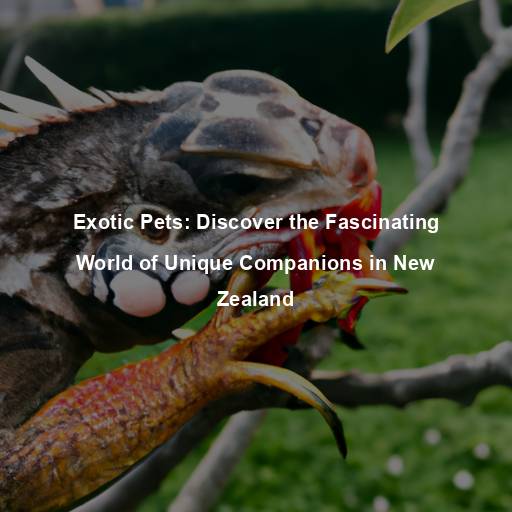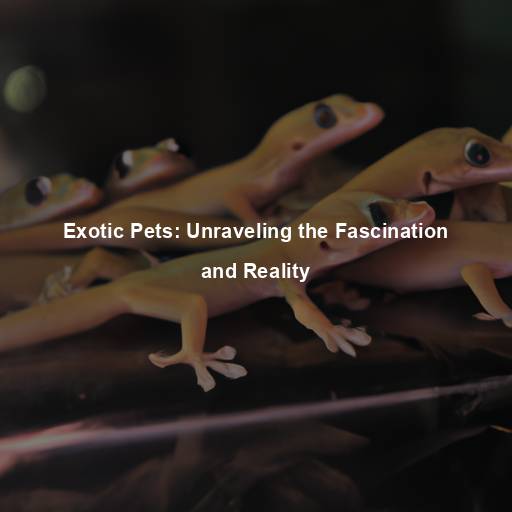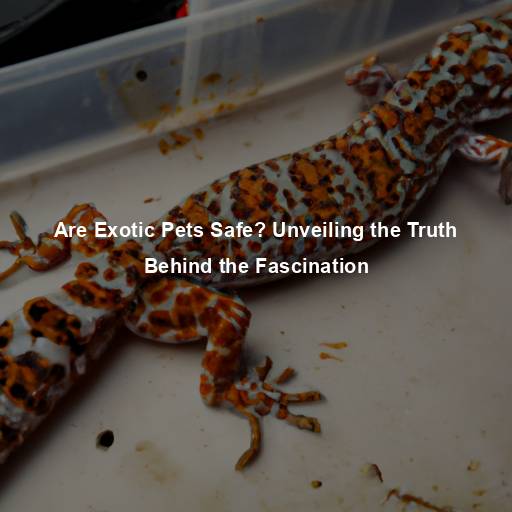What Exotic Pets are Legal in England?
Last Updated on August 6, 2023 by Evan
Contents [hide]
- 1 Legal Framework for Keeping Exotic Pets in England
- 1.1 The Dangerous Wild Animals Act 1976
- 1.2 The Exotic Pet License
- 1.3 Exotic Pets That Require a License
- 1.4 Popular Exotic Pets That Do Not Require a License
- 1.5 Responsible Ownership and Ethical Considerations
- 1.6 Ensuring Adequate Care and Husbandry
- 1.7 Enclosures and Habitat Enrichment
- 1.8 Proper Nutrition and Veterinary Care
- 1.9 Socialization and Mental Stimulation
- 2 Challenges and Considerations
- 3 The Fascination of Exotic Pets
- 4 Ethical Considerations and Controversies
- 5 Responsible Exotic Pet Ownership
- 6 FAQs: What Exotic Pets are Legal in England?
- 6.1 What is considered an exotic pet in England?
- 6.2 Are all exotic pets legal to own in England?
- 6.3 What are some examples of legal exotic pets in England?
- 6.4 Are there any restrictions on owning certain exotic pets in England?
- 6.5 Can I keep a monkey as an exotic pet in England?
- 6.6 How can I find out if a specific exotic pet is legal to own in England?
- 6.7 What should I consider before getting an exotic pet in England?
Legal Framework for Keeping Exotic Pets in England
In the realm of pet ownership, many individuals seek unique and exotic companions to add a touch of excitement and wonder to their lives. However, before embarking on the journey of acquiring an exotic pet, it is essential to understand the legal framework surrounding their ownership. In England, the laws governing exotic pet ownership are designed to ensure the welfare and safety of both the animals and the general public. Let us delve into the fascinating world of exotic pets and explore what species are legal to keep in England.
The Dangerous Wild Animals Act 1976
The primary legislation pertaining to the ownership of exotic pets in England is the Dangerous Wild Animals Act 1976. Enacted in response to concerns about public safety and animal welfare, this act regulates the keeping of certain species that are considered to be dangerous and require special care and attention. The aim is to prevent incidents and ensure that the animals are adequately cared for in suitable environments.
The Exotic Pet License
Keeping exotic pets can be quite a thrilling experience, but it’s not all fun and games! Did you know that in order to legally keep certain species under the Dangerous Wild Animals Act 1976, individuals must go through a rigorous licensing process? Yep, that’s right! Local authorities are in charge of granting licenses, which can come in the form of a zoo license or a private keeper’s license.
Exotic Pets That Require a License
While many exotic pets can be legally kept without a license, certain species require a license under the Dangerous Wild Animals Act 1976. These species are considered to be potentially dangerous or pose a risk to public safety if not properly managed. Some examples of animals that require a license include:
Step into the fascinating world of big cats, where the regal lions, powerful tigers, and lightning-fast cheetahs reign supreme. These awe-inspiring creatures, with their majestic presence and untamed beauty, captivate our imagination. However, it’s important to note that owning these magnificent beasts comes with a host of complexities, as their predatory instincts and potential risks to humans necessitate a specialized license. Explore the perplexing nature of these extraordinary felines and discover the enigmatic allure they hold for enthusiasts around the globe.
The world of primates never ceases to amaze with its diverse cast of characters. From the playful monkeys to the wise chimpanzees, these creatures captivate us with their intelligence and strength. However, the responsibility that comes with owning these complex beings cannot be taken lightly, as they require expert care and constant supervision.
-
Venomous Reptiles: Certain venomous reptiles, including venomous snakes and large constrictor snakes, require a license. These animals demand specialized knowledge and secure enclosures to prevent any harm to humans.
-
Crocodilians: Alligators and crocodiles fall into this category. Due to their size, strength, and potential danger, owning these reptiles necessitates a license to ensure proper containment and care.
-
Wild Dogs: Species such as wolves and wolf-dog hybrids are considered exotic pets and require a license. These animals possess wild instincts and require experienced handling and appropriate living conditions.
Popular Exotic Pets That Do Not Require a License
Great news for pet lovers looking to add a touch of the extraordinary to their lives! Thanks to the exemptions provided by the Dangerous Wild Animals Act 1976, a plethora of fascinating creatures can grace your home without the need for a cumbersome permit. From delightful reptiles to enchanting birds, the list of exotic pets that fall outside the licensure requirement is extensive and varied, offering endless opportunities for those seeking a unique companion. So, set your adventurous spirit free and explore the world of legally license-free exotic pets!
-
Reptiles: Snakes, lizards, and turtles are a popular choice among reptile enthusiasts. From the colorful and docile corn snakes to the fascinating bearded dragons, reptiles offer a captivating and low-maintenance pet ownership experience.
-
Small Mammals: Animals such as sugar gliders, hedgehogs, and degus are adored for their small size, unique characteristics, and relatively straightforward care requirements. These furry companions can bring joy and delight to their owners.
-
Birds: Certain species of birds, such as parakeets, canaries, and budgies, are widely kept as exotic pets. Their melodious songs and vibrant plumage make them a popular choice for bird lovers.
Step into the mesmerizing realm of the animal kingdom’s unsung heroes – the invertebrates. No special permissions required, as these captivating creatures can be kept by anyone with an appreciation for the smaller inhabitants of the natural world. From the enigmatic tarantulas to the enigmatic mantises, be prepared to delve into the perplexing and beguiling universe of these fascinating arthropods.
Responsible Ownership and Ethical Considerations
In the realm of exotic pet ownership, legality is just the tip of the iceberg. To truly embody responsibility, potential owners must plunge into a swirling sea of knowledge, delving deep into the individual needs and whims of their desired species. Carefully combing through the intricate details of care, diet, and living arrangements is not a mere suggestion, but a vital obligation. Rest assured, fulfilling the idiosyncratic requirements of exotic pets is no walk in the park, cultivating a perplexing yet rewarding journey towards ensuring their well-being and contentment.
In the world of exotic pet ownership, one cannot simply overlook the ethical dimension. It becomes imperative for potential owners to delve deep into the perplexing web of ethical considerations tied to keeping certain exotic species as pets. It becomes a jigsaw puzzle of understanding which animals are truly suited for domestication, while also taking into account the distress and torment that captivity might inflict upon them. When embarking on this unique journey, it is crucial to make conscientious choices by opting for species that can flourish within the confines of a domestic setting, thus discouraging the illegal trade of wildlife.
Ensuring Adequate Care and Husbandry
When it comes to exotic pets, providing appropriate care and husbandry is of utmost importance. These unique creatures often have specific dietary, environmental, and social needs that must be met to ensure their well-being. It is crucial for owners to educate themselves on the requirements of their chosen exotic pet species and create an environment that mimics their natural habitat as closely as possible.
Enclosures and Habitat Enrichment
Creating a suitable enclosure is essential for the welfare of exotic pets. The size, temperature, humidity, lighting, and substrate within the enclosure should be carefully considered to meet the specific needs of the animal. Enrichment items, such as hiding places, climbing structures, and toys, should be provided to stimulate natural behaviors and prevent boredom.
Proper Nutrition and Veterinary Care
Exotic pets often have specialized dietary needs that must be met to ensure their health and vitality. Owners should consult with a veterinarian experienced in exotic pet care to develop a nutritionally balanced diet for their pet. Regular veterinary check-ups are also crucial to monitor the animal’s overall health and detect any potential issues early on.
Socialization and Mental Stimulation
Did you know that many of the exotic pets we love to have as companions are incredibly social animals? It’s true! They need mental stimulation and regular interaction with others of their kind in order to truly thrive. As responsible owners, it’s crucial that we give them the chance to engage in their natural behaviors and socialize with fellow animals when it’s feasible.
Challenges and Considerations
Financial Responsibility
Owning an exotic pet can come with significant financial responsibilities. Apart from the initial cost of acquiring the animal and setting up an appropriate enclosure, there are ongoing expenses such as food, veterinary care, enrichment items, and potential permits or licenses. Prospective owners should carefully consider whether they have the financial means to provide for the long-term care of an exotic pet.
Time and Commitment
Owning an exotic pet is a journey into the unknown, filled with wonder and astonishment. These captivating creatures demand an unwavering investment of time and dedication, summoning daily rituals of feeding, cleaning, and engaging in delightful social encounters. But that’s not all – these peculiar pets often come with a checklist of environmental idiosyncrasies, leaving owners in a constant state of vigilance and upkeep. It is imperative for prospective owners to navigate the labyrinth of their own lifestyles, ensuring they have the capacity to embark on this perplexing and captivating journey of exotic pet companionship.
Education and Experience
Properly caring for an exotic pet requires knowledge, experience, and continuous education. Owners must familiarize themselves with the specific needs of their chosen species and stay informed about the latest research and best practices in exotic pet care. It can be beneficial to seek guidance from experienced exotic pet owners, join online communities, or attend educational workshops or seminars.
Travel and Accommodation
Owning an exotic pet may present challenges when it comes to travel and accommodation. Some species require specialized care or environments that may not be easily accommodated during travel or in certain living situations. Owners should consider these factors and make appropriate arrangements before acquiring an exotic pet.
The Fascination of Exotic Pets
The allure of exotic pets is undeniable, captivating the imaginations of animal enthusiasts with their striking appearances and intriguing behaviors. The chance to observe rare or uncommon species up close is nothing short of a wonder, filling us with fascination. However, it is of utmost importance that we approach the ownership of these pets with responsibility, ensuring the welfare of the animals and abiding by the necessary legal regulations. In this perplexing world of exotic pets, let us embrace burstiness – bursting with respect, bursting with knowledge, and bursting with compassion.
Educational Opportunities
Having an exotic pet is a wild adventure like no other. Not only does it ignite a sense of wonder in both grown-ups and little ones, but it also opens up a mesmerizing world of discovery. From exploring distinctive species and their awe-inspiring habitats to unraveling their curious behaviors, the hands-on involvement with an exotic pet is a captivating journey that nurtures a deep appreciation for nature and wildlife conservation.
Therapeutic Value
Interacting with exotic pets can have therapeutic benefits for individuals of all ages. The presence of these fascinating creatures can provide companionship, reduce stress, and improve mental well-being. Exotic pets, such as reptiles or small mammals, can be particularly beneficial for individuals with allergies or those who are unable to care for traditional pets.
Conservation Awareness
Owning and nurturing enchanting exotic pets has the remarkable power to foster a profound reverence for the immense significance of conservation endeavors. Countless awe-inspiring species of these pets teeter on the brink of extinction in their native domains, their fate imperiled by nothing less than the heart-wrenching trifecta of vanishing habitats, rampant poaching, and the nefarious underworld of illicit wildlife commerce. In the midst of this perplexing labyrinth, responsible guardianship not only bestows awareness but also becomes a resoundingly pivotal force uplifting the banner of conservation.
Personal Growth and Responsibility
Having an exotic pet is no cakewalk – it demands unwavering commitment, unyielding patience, and ironclad responsibility. It’s not just about having a cool critter to show off; it’s a chance to nurture personal growth by prioritizing their well-being, mastering the art of time management, and honing the delicate skill of caring for another living being. This heightened sense of duty can work its magic on every corner of life, leaving an enchanting ripple effect in its wake.
Ethical Considerations and Controversies
Wildlife Conservation and Illegal Trade
The exotic pet trade can have negative implications for wildlife conservation. The demand for rare and unique species can contribute to the illegal wildlife trade, leading to the unsustainable capture and smuggling of animals from their natural habitats. It is crucial for prospective owners to ensure that the species they are interested in acquiring have been responsibly bred in captivity and are not supporting illegal trade.
Domestication and Welfare Concerns
While some exotic pet species have been successfully domesticated and can thrive in a domestic setting, others may struggle with captivity-related stress or have specialized needs that are challenging to meet. It is important to consider the welfare of the animals and choose species that are suitable for domestication. Researching the natural behavior, lifespan, and specific care requirements of a potential exotic pet is crucial to ensure their well-being.
Zoonotic Diseases and Public Health
Exotic pets, like any animal, can carry zoonotic diseases that can be transmitted to humans. It is essential for owners to practice good hygiene, regularly clean and disinfect enclosures, and handle their pets responsibly to minimize the risk of disease transmission. Additionally, individuals with weakened immune systems or certain allergies should exercise caution when considering exotic pets.
Responsible Exotic Pet Ownership
Extensive Research and Education
Considering the allure of exotic pets, one must dive deep into the enigmatic realm of research before making an informed decision. The intricate dance of comprehending their unique habitat, peculiar dietary needs, idiosyncratic behaviors, and, of course, the enigmatic specifics of their care cannot be overstated. Entrusting reliable sources, where the crème de la crème of knowledge resides – from esteemed literature to scholarly journals and the wise counsel of seasoned exotic pet aficionados or seasoned veterinarians – is an absolute necessity. Only through the revelation of such mysteries can one ensure a sanctuary of well-being for these fascinating creatures.
Choosing the Right Species
When it comes to exotic pets, finding the perfect match can be quite the puzzle. With so many species to choose from, it’s essential to navigate through the whirlwind of options and consider what aligns with your lifestyle, experience, and ability to meet their distinctive needs. From assessing space requirements to understanding activity levels, social needs, and compatibility with other pets or family members, the journey to finding the ideal exotic companion may be perplexing. Seeking advice from experts or connecting with exotic pet communities can help unravel the enigma and guide you towards the best decision for both you and your potential exotic friend.
Establishing a Relationship with a Reputable Veterinarian
Ensuring the optimal health and happiness of our beloved exotic pets is a matter of utmost importance. The key lies in forging an unwavering bond with a skilled veterinarian, well-versed in the intricate art of caring for these enigmatic creatures. Through regular check-ups and, when applicable, timely vaccinations, we embark on a journey to safeguard their well-being. Furthermore, these knowledgeable caretakers hold the key to unlocking a treasure trove of wisdom on proper nutrition, preventive measures, and even tackling the perplexing realm of behavioral quirks.
Ongoing Enrichment and Mental Stimulation
Keeping exotic pets can be a puzzling endeavor, as their unique needs can leave even the most experienced pet owners scratching their heads. These animals require a mental playground unlike any other, necessitating a vibrant array of toys, puzzles, and enrichments to keep them on their toes. Additionally, understanding the importance of socialization for certain species is crucial, as it adds yet another layer of perplexity to the complex equation of their well-being.
FAQs: What Exotic Pets are Legal in England?
What is considered an exotic pet in England?
Venture beyond the realm of traditional household companions like dogs, cats, birds, and fish, and you’ll uncover a captivating world of exotic pets in England. From enigmatic reptiles and alluring arachnids to enchanting amphibians, petite mammals, and even some feathered friends, the choices are as diverse as they are intriguing. Explore the extraordinary and embrace the allure of these unique creatures that defy convention.
Are all exotic pets legal to own in England?
No, not all exotic pets are legal to own in England. The legality of owning an exotic pet depends on several factors, including the species, the risk they pose to the environment and public safety, and whether they are protected by international or national laws. Some exotic pets may require special licenses or permits to keep.
What are some examples of legal exotic pets in England?
Examples of exotic pets that are legal to own in England without a special license include certain species of reptiles like geckos, corn snakes, and bearded dragons. Some small mammals like hamsters, guinea pigs, and rabbits are also considered exotic pets but can be freely owned. Additionally, some species of birds like budgies and cockatiels can be kept as pets without a license.
Are there any restrictions on owning certain exotic pets in England?
Yes, there are restrictions on owning certain exotic pets in England. For example, venomous snakes, large constrictor snakes, crocodilians, and primates are generally not allowed to be kept as pets without a Dangerous Wild Animals License. This license is required to ensure that the owner has the appropriate knowledge and facilities to care for the animal safely and prevent any potential risks to the public or the animal itself.
Can I keep a monkey as an exotic pet in England?
In general, it is illegal to keep a monkey as a pet in England without a Dangerous Wild Animals License. Monkeys are considered primates and pose potential risks to public safety and welfare due to their complex needs and behaviors. This license ensures that the necessary welfare standards are met and that the owner is capable of providing the appropriate care for the monkey.
How can I find out if a specific exotic pet is legal to own in England?
To find out if a specific exotic pet is legal to own in England, you should consult the appropriate authorities. The Animal Welfare Act 2006 and the Dangerous Wild Animals Act 1976 provide guidelines regarding the legality and licensing requirements for keeping exotic pets. Additionally, you can contact your local council or the Animal and Plant Health Agency (APHA) for further information and guidance.
What should I consider before getting an exotic pet in England?
Before getting an exotic pet in England, it is important to research and consider various factors. These include the specific care requirements of the animal, its lifespan, potential health issues, legal restrictions, availability of specialized veterinarians, and your ability to provide a suitable environment and diet. It is also crucial to ensure that obtaining an exotic pet does not contribute to illegal wildlife trade or threaten endangered species’ conservation efforts. Responsible ownership requires commitment, education, and proper consideration of all these factors.

